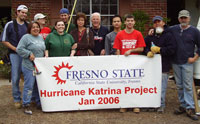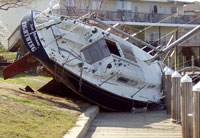Part one of two
Lending a Helping Hand
Students travel to Lousiana to help victims of Hurricane Katrina

Douglas Sulenta / The Collegian
Above: With thousands of homes destroyed by Hurricane Katrina, 46 students (some pictured above) traveled from Fresno State to help in relief efforts.
Below: The force of Hurricane Katrina was strong enough to drive this boat from its dock to the pier.

|
By Douglas Sulenta
The Collegian
Earlier this month a group of 46 Fresno State students, instructors and local volunteers led by three instructors, traveled to Louisiana to assist in the reconstruction efforts in Slidell, LA.
In Slidell, a small city about 30 miles northeast of New Orleans, the group was housed at the First Baptist Church.
Since Hurricane Katrina this church has served as a relief center in Slidell, feeding nearly 10,000 people daily immediately following the hurricane.
The first full day in Slidell saw the Fresno State group immediately take to the city on a series of projects: The students first went out into the community to do “mud outs.” Mud outs consist of removing the mud from the floors of a once flooded house, ripping out the walls, insulation, cabinetry, removing belongings and anything else damaged by the flooding. Then the house is cleaned of all the debris so builders could come in and start to rebuild.
The second day the group started on their three main projects in the city. “House 1” belonged to Morgan Zimmerle. Like most, Zimmerle left the city, heeding the advice of the authorities to evacuate and upon returning found his house destroyed.
“Me and my two boys returned to assess the damages and found out we had six and a half feet of water in the house and four to six inches of that was a black muddy goop that smelled terrible,” Zimmerle said.
Some, though, didn’t take the advice of the authorities quite as seriously, and luckily, lived to tell about it.
“Last year we had Ivan that came through and wound up hitting Texas. So we got on the highway and were going to evacuate,” said Gene, an elderly woman that lives with her father around the corner from Zimmerle. “This year when they said evacuate, I told Daddy, ‘Today I ain’t going no place. I’m staying here.’”
Stay there they did. That is until the water flooded into their house and up to their necks. Luckily though, they were saved by two men patrolling the area.
The crew at Zimmerle’s had the mission of insulating and sheet rocking the entire eight room house, floor to ceiling. This they barely got done, often having to work 10 to 12 hour days to do so.
“House 2” belonged to Yvonne Galatas, an elderly widow who had a tree fall through the roof of her house and also had considerable water damage inside. The crew’s job there was to replace the half of the roof that was damaged. They finished by Wednesday and were then treated to an emotional meeting with the owner of the house.
“I almost cried today when I saw the lady,” said Troy Sherry, a sophomore business marketing major and member of the Sigma Nu fraternity. “She just kept saying ‘Thank you, thank you very much.’ Seriously, I was about to cry. I had to go into the other room and look away.”
“House 3” belongs to an elderly retired man named Jerry Chustz. Jerry’s house also had to be insulated and sheet rocked floor to ceiling. John and Jamie headed this crew up, a couple from Michigan the Fresno State group met at the church and made fast friends with. Their help proved invaluable to the operation, for it was logistically nearly impossible for three supervisors to supervise and run materials to nearly a half dozen different sites.
Comment on this story in the News forum >>
|
